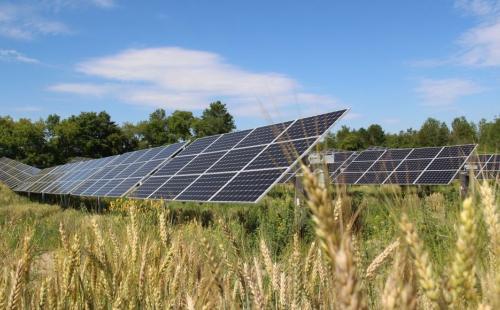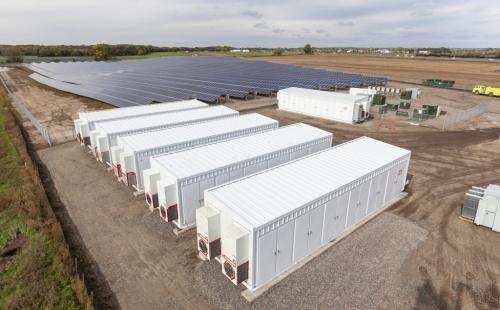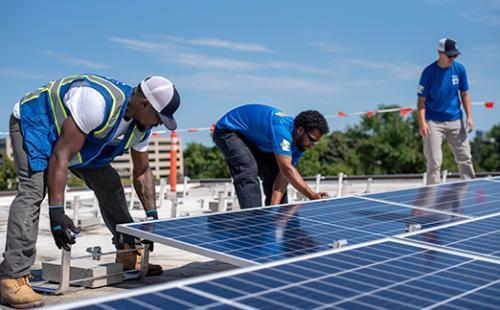Updated June 2023
Each year MnSEIA works to move Minnesota's solar + storage industry forward through strong, industry-wide legislation. 2023 saw our most ambitious agenda yet with over 72 bills and provisions. Building upon years of lobbying efforts and bipartisan relationships paid off with historic wins for solar + storage. Over $80 million in funding for solar + storage initiatives and many critical policy changes were passed in a truly monumental legislative session.
Below is a summary of industry wins in the Omnibus Environment, Natural Resources, Climate, and Energy Finance and Policy bill (HF 2310) and what's next for the industry. A huge thank you to our partners and members for helping us get these bills over the finish line!
Community Solar Garden Modernization
Minnesota’s community solar garden (CSG) program, started by bipartisan state legislation in 2013, has created over 860 megawatts of solar in the state and thousands of jobs. Minnesota ranked 1st in the nation for the largest CSG program for years, but due to outdated rules and gridlocked negotiations, we’ve fallen behind.
After years of negotiations, long-awaited updates to improve the CSG program were signed into law. They include:
- Contiguous county restriction removed for new projects. This arbitrary rule said CSG subscribers had to live in the same county as the solar garden or a county contiguous (next to.)
- Individual garden size cap increased from 1 MW to 5 MWs.
- New cap on the subscriber-based CSG program with:
- 100 MW cap each year in the years 2024-2026;
- 80 MW cap each year in the years 2027- 2030; and
- 60 MW cap each year after 2030.
- New rate structure defined: CSGs will now use a net-metering rate instead of the Value of Solar rate. This will be discounted based on customer “class” to encourage low-to-moderate income subscribers.
- New subscriber requirements: 25 subscribers per MW of solar, 55% of subscribers are public interest, and 30% must be low-to-moderate income (LMI.)
Finally, the bill establishes a new Distributed Generation (DG) Standard that requires all utilities to meet a new percentage of solar development through non-subscriber, competitively bid DG solar. The new DG program will include:
- 3% of Xcel Energy retail sales to be from DG solar by 2030 (approximately 700 MW);
- 3% of Minnesota Power sales to be from DG solar by 2030 (excluding industrial customers);
- 1% of Otter Tail Power sales to be from DG solar by 2030; and
- Grid-connected projects up to 10 MW.
To accomplish the new DG standard the agreement will:
- Require Xcel to include DG solar in its Integrated Distribution Plan (IDP) and make all needed upgrades to the grid to accommodate the new DG Standard; and
- Evaluate cost saving measures including: smart inverter usage, flexible interconnection agreements, grid management tools, DER management tools, and export tariffs.
Creating a new DG market is huge for Minnesota's industry and will result in hundreds of megawatts of solar and new jobs.
See more about this legislative push in articles on our media page.
Energy Storage Expansion
Minnesota has untapped potential for an extensive energy storage market, which will in turn support the clean energy transition and more solar deployment. MnSEIA led the multi-year effort to create Minnesota's first energy storage incentive program. 2023 legislation included:
- $7 million for on-site energy storage systems;
- $250 thousand for an energy storage system capacity study evaluating the amount of energy storage required to achieve the state’s new 100% carbon free standard;
- $3.4 million for the University of St. Thomas Center for Microgrid Research.
These wins will jumpstart the MN market and send a business signal that Minnesota is serious about energy storage. MnSEIA will build upon this success in future legislative sessions to further expand the industry.
Freedom to Go Solar for Homeowners Associations (HOA) Homeowners
A long-awaited and multi-year effort paid off this session when legislation was passed saying that Homeowners Associations (HOAs) can no longer outright ban solar. HOAs can still place reasonable restrictions on solar installations. 1 in 4 Minnesotans live in the state's 7,700 HOAs, and were frequently blocked from adding solar to their roofs for arbitrary reasons.
Legislation also allows utility customers to request their energy usage data from utilities. This is a huge win for customer rights!
Interconnection and Grid Infrastructure Improvements
Interconnection delays are a top concern for MnSEIA and our members. They can be very costly and hurt small businesses and workers. HF 2310 passed:
- $10.2 million for distributed energy upgrade grants to improve interconnection timelines;
- $5.3 million for electric grid resiliency grants.
There's still more work required to improve Minnesota's grid and interconnection wait times. MnSEIA will continue to work on this issue at the regulatory level and in future legislation sessions.
Residential and Small-Scale Commercial & Industrial Solar Advancements
The small-scale distributed generation (DG) solar market is an important component of creating a more reliable, resilient, and secure grid. The below initiatives will have a huge impact on the Minnesota market.
- $29.3 million in funding for the popular Solar for Schools program. Energy is the 2nd highest cost for districts, after payroll, and solar can help schools save money and invest in other programs;
- $5 million for a Solar on Public Buildings program to increase solar access to a wider range of Minnesota's communities and local and tribal governments;
- $4.2 million for the National Sports Center in Blaine to add a 1,800,000 kW solar array. Solar is expected decrease the Center's energy costs by over $160,000 a year;
- $12.5 million for the Solar*Rewards program. Solar*Rewards provides a financial incentive for Xcel Energy customers to install solar, making solar more accessible for the average homeowner;
These initiatives will help build our 21st century grid while supporting local businesses, growing jobs, and meeting the demands of Minnesotans.
Other Wins
2023 was a banner year for clean energy and climate change policies. Other energy-related wins include the 100% carbon-free energy by 2040 standard, funding for a multi-agency study to develop a statewide system for reusing and recycling solar panels, workforce training, electric vehicle rebates, a State Competitiveness Fund designed to match federal grants for renewable energy projects, and more. This unprecedented interest in renewable energy is a great sign of further progress to come!
What's Next
Our work is never finished. Next, MnSEIA turns our attention to ensuring new policies and funding are correctly interpreted and implemented at the Minnesota Public Utilities Commission. We're already mapping out plans for the 2024 Legislative Session and beyond, including:
- Interconnection improvements;
- Net-metering reform;
- Expand the Minnesota Brightfields market (solar on landfills);
- Continue to expand the Energy Storage industry and define rules and regulations;
- And more
We're effective at the Capitol because of the support and voices of our 145+ members. The more members we have standing behind us, the greater impact we can make. If your company is not a MnSEIA member yet, join us!

About MnSEIA: The Minnesota Solar Energy Industries Association (MnSEIA), a 501(c)6 nonprofit, promotes and protects Minnesota’s solar and storage industries. Representing over 140 businesses, we advocate for solar and storage with key local and state officials in a unified and actionable way.
MnSEIA's ambitious legislative work would not be possible without the support of our members - thank you! Stay up-to-date with our work throughout the year by following us on Twitter.
Questions? Email MnSEIA's Executive Director, Logan O'Grady.




